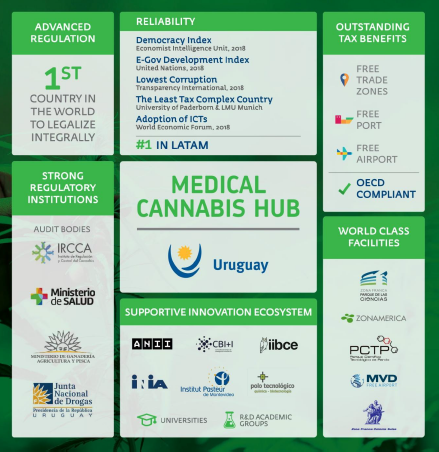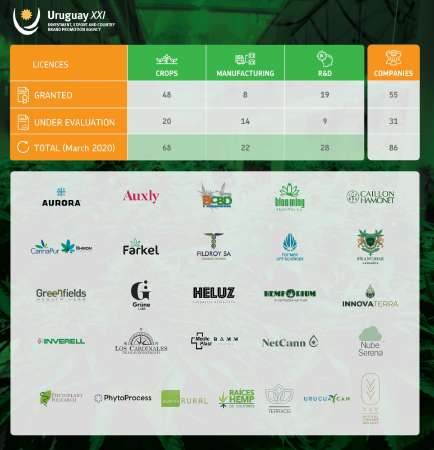Uruguay XXI, the country’s export and investment promotion agency (Uruguay’s DiT-equivalent, for those of you in the UK), has just published a report on investment opportunities in cannabis. As usual, it is an excellent piece of work. We’d like to share with you only a few snippets of information and our opinion here (you can check out the full report in Spanish and English here).
- As of March 2020, there were 40 companies cultivating non-psychoactive cannabis in Uruguay authorised by the ministry of agriculture, totalling 600 ha.
- According to IRCCA (regulator), there are 9 licences for psychoactive cannabis, 9 for industrial processing and 18 for research.
- Most of the production is done in open fields, with some greenhouses, too, which demand for example lighting, specialist climate control, fertilisers and irrigation.
- According to the ministry of agriculture, 90% of companies currently produce flowers, and are export-oriented.
- The first exports date from 2019 with the largest value corresponding to Fotmer, which sold USD 3.2m worth of flowers, becoming the first company in Latin America to commercialise this product.
- Uruguay was the first country in the world to regulate cannabis production, back in 2013, for recreational, medicinal and industrial use. Uruguay was the first country in the world to establish a regulatory framework for all of the plant’s functionalities.
- In February 2015, scientific research relating to cannabis was promoted by law.
- Uruguay already has important cannabis investments, all focused on exports.
- Uruguay has plenty of experience in traceability, something key in cannabis and particularly in medicinal cannabis for demanding export markets.
- The country also has plenty of experience in plant genetics and is attractive as a counter season option in the Southern hemisphere. The report emphasises the potential of local genetic development.
- According to the report, cannabis could become the country’s largest agroindustrial export. For us working in agriculture and livestock, that’s a difficult one to take, but it says a lot about the potential of this crop. The report also highlights that this could become the value chain with the most value added in Uruguay’s agriculture.
- Interestingly, the report also mentions potential spillovers to tourism and education, for example.


In our opinion:
- There are plenty of opportunities for investors in a country that, despite its drawbacks (regulatory being probably the strongest in cannabis, according to consulted specialists), can be hugely attractive. Beyond the sector-specific advantages above, Uruguay has strong institutions, safety, transparency, democracy, a qualified labour force and investment grade status, which are all key assets globally and, particularly, regionally.
- In the midst of the current coronavirus crisis, Uruguay becomes even more attractive to investors, suppliers/exporters and those wanting to relocate here to do business. Uruguay has been so far doing a commendable job of dealing with the crisis.
- A new pragmatic, liberal, pro-agriculture and pro-business centre-right government took office on 1st March (bucking the populist trends in the neighbourhood). Transition has been smooth (a national strength) and there are strong signals to indicate that this is a good time to invest (including new and some old reinforced incentives, particularly given the need to generate employment).
- The country has distinct competitive advantages within Mercosur (so compared to Paraguay, Argentina and Brazil). Although, as the report explains, Colombia, Mexico and Chile are more advanced in regulation, Uruguay competes favorably with Colombia and Mexico in terms of size (it is more manageable) and international reputation. Chile is not in its best moment right now, given the pandemic and social unrest.
Working in cannabis in Uruguay can be highly rewarding. However, it will also require plenty of patience (particularly on the regulatory side) and a long-term view. Being here is essential and building business relationships is a must.
What you can do now:
- If you are interested in investing, we are happy to help you with soft-landing, including coordinating the necessary public and private sector support, building a network of suppliers and trusted professionals and briefing you (on the good and the not so good). We get involved as much or as little as you need us to, becoming your one point of contact. Uruguay XXI also provide excellent advice and support for investors – you can reach them here or drop us an email and we’ll connect you.
- If you are interested in selling to this sector, we can help with market research, partner recruitment, and (virtual) trade missions. While travel restrictions apply, we can be your eyes and years on the ground.
- If you are interested in R&D, we can help with that, too, just get in touch.
This is a niche we are developing for our consultancy business, building contacts, knowledge and understanding. Together with agrifood and forestry, it makes sense since we are based here in Uruguay to focus on an area that we have seen increasing demand for from our global clients and where we can add real value. Any questions, do get in touch at
